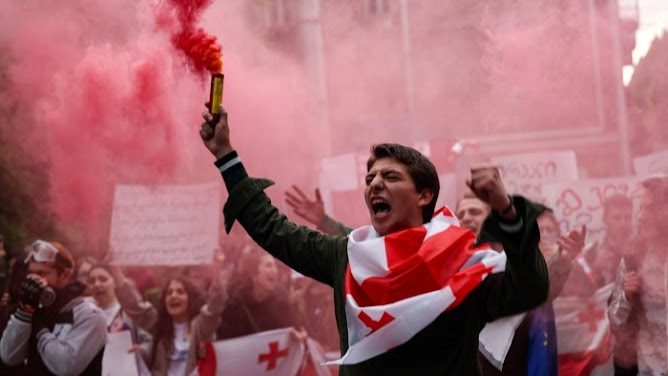The west needs to prepare for a crisis in Georgia
Tbilisi is drifting towards neutrality and the Russian sphere of influence
Tim Judah
 Georgians protest against the so-called ‘foreign agents’ bill in May. If the country’s ruling party holds power in next month’s election, Tbilisi will slide further from the west © Giorgi Arjevanidze/AFP/Getty Images
Georgians protest against the so-called ‘foreign agents’ bill in May. If the country’s ruling party holds power in next month’s election, Tbilisi will slide further from the west © Giorgi Arjevanidze/AFP/Getty ImagesGeorgia is adrift.
As the nation counts down towards elections next month, many who oppose the ruling Georgian Dream party believe it will resort to anything to maintain its grip on power.
Russian leaders already foresee a violent denouement in the wake of the poll.
After years of integrating into Euro-Atlantic structures, Bidzina Ivanishvili, Georgia’s de facto leader, sensing power draining away from him and those in his camp who run the regions, has wrenched it from this course.
Georgia is now floating in the no man’s land between the west and the Russian-cum-Brics world.
Western leaders need to brace for a full-blown Georgian crisis.
They need to be ready with a plan.
The atmosphere in Tbilisi is febrile.
For some, it recalls the parliamentary election of 2012, when Ivanishvili defeated Mikheil Saakashvili.
Saakashvili had come to power in 2004 and his first four years were full of optimism and progress.
Then, in the wake of the 2008 Russian military intervention in Georgia and the global financial crisis, his administration succumbed to authoritarianism, violence and corruption.
That trajectory has repeated itself under Ivanishvili.
This spring, tens of thousands demonstrated against a Russian-style “foreign agents law” for NGOs.
This is not a benign act aimed at financial transparency, but one designed to shut down watchdogs and others who track corruption and call the government to account.
The government is also preparing legislation against LGBT “propaganda”.
All this is a tragedy.
The Ukrainian war opened an utterly unexpected opportunity for Georgia which resulted in it being offered EU candidate status.
Maybe Ivanishvili, as opposed to most Georgians, never wanted this unanticipated gift.
Aligning with the bloc’s standards, at least to join, would mean a major clean up in the way the country, including its judiciary, is run.
But as a result of the government’s recent actions the accession process has been frozen, though Ivanishvili is still promising EU membership by 2030.
Despite activists being threatened and beaten, opposition leaders in Tbilisi are convinced that power is within their grasp.
Ivanishvili has lost it, they say.
He rants about a shadowy “Global War party” that funds NGOs and is determined to drag Georgia into a “second front” war against Russia.
The opposition is diverse but the ruling party brands it all as a “collective UNM”, referring to the party of the now jailed Saakashvili.
If it were only the people of Tbilisi who were voting, the opposition might have an easy ride.
But it is not.
In the small town of Akhaltsikhe, close to the border with Turkey, locals say that they always vote for the party in power.
One reason for this is that large numbers of jobs in places like Akhaltsikhe depend on the municipality or the state.
People fear that if power changes, their boss will be replaced with someone from the winning party who will in turn redistribute jobs and contracts to their own friends and family.
People are intimidated, too.
Tamuna Uchidze, who works for the Akhaltsikhe branch of Transparency International, the anti-corruption organisation, tells me that she had seen messages from a local university professor ordering his students to attend a rally of Ivanishvili.
If they did not, she says, their grades could suffer.
Irakli Lazarashvili, the Georgian Dream mayor, scoffs at the suggestion that his party was getting close to Moscow.
“Russia is our enemy,” he says.
“Our way to Europe will never be stopped.”
Analysts and pollsters suggest that Georgian Dream and the opposition are attracting about a third of the electorate each, with the rest undecided.
This means things could turn nasty in October.
Sergei Naryshkin, director of the Russian Foreign Intelligence Service, has said that if the opposition loses, the US is planning a “Tbilisi Maidan”, by which he means a coup.
That is absurd.
But if Georgian Dream falls short of victory, it might still claim it, provoking angry demonstrations and even violence.
If it wins fair and square, Tbilisi will continue to drift away from the west.
If it loses but tries to cling on to power, Georgians will look to the west, in which case the actions of those governments could be decisive.
Eka Metreveli, who heads the Georgian Foundation for Strategic and International Studies, says her country is now moving towards neutrality and into the Russian sphere of influence.
The vast majority of Georgians, she insists, “do not want that”.
The writer is author of ‘In Wartime: Stories from Ukraine’
0 comments:
Publicar un comentario